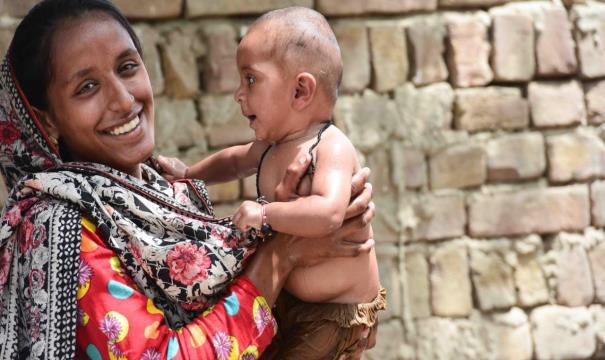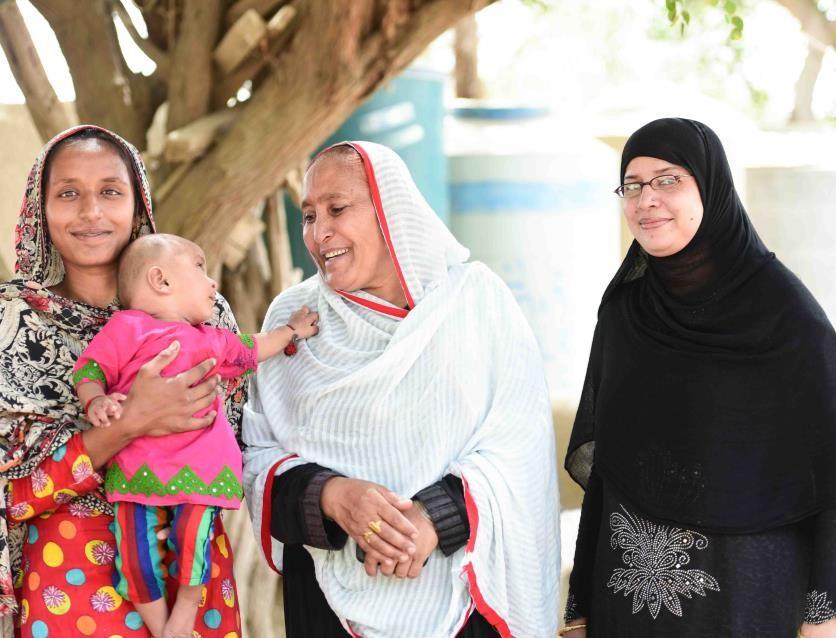When 22-year-old Kausar became pregnant, an MCHIP-trained Lady Health Worker, Sehat Panhwar, gave her advice that likely saved her future daughter’s life: have your baby delivered by a skilled birth attendant, she said, referring the mother-to-be to the nearest facility.
Several months later, Kausar’s daughter was born at the Mithani Rural Health Center (RHC), blue and not breathing. Without skilled support, this day could easily have ended in tragedy for this new family. Thankfully, Sehat’s suggestion to plan for a facility birth meant Kausar’s newborn was in the care of trained nurse who successfully resuscitated her after birth.
Until her fateful meeting with Sehat, there had been no easy or regular access to facility health care for Kausar. Her husband, Nadeem, works for daily wages, making services at a private clinic financially out of their reach. And before meeting Sehat, the couple was unaware of the services offered at the health center.
MCHIP worked in 16 districts of Sindh – including Naushahro Feroze, where Kausar and Nadeem live – to strengthen the capacity of Lady Health Workers (LHWs) like Sehat to provide information on maternal and newborn health. This includes stressing the importance of safe delivery by a skilled birth attendant.
The Sindh LHWs Program was initiated by the Government of Pakistan under the National Program for Family Planning and Primary Health Care in 1994 as part of an effort to achieve universal health coverage through community-based primary care. However, after the program in Sindh collapsed due to a lack of funds, MCHIP conducted targeted activities to revitalize it, ultimately training more than 3,556 LHWs in communication skills and maternal, newborn and child health practices since 2013. The rejuvenated LHW program helped increase the demand for improved quality services by mothers for themselves and their babies.
Sehat convinced Kausar and Nadeem that Mithani RHC – 12 km (7.4 miles) from their village and reachable by a dirt road – was the best option for their daughter’s birth. MCHIP had introduced an important new intervention at the facility: Helping Babies Breathe (HBB), a methodology for newborn resuscitation that can prevent neonatal deaths due to birth asphyxia by practicing a series of steps in “the golden minute” after birth.
MCHIP’s support to selected health facilities in Naushahro Feroze District – such as Mitani RHC, where Kausar delivered – included the establishment of HBB corners with related equipment, ventilation areas, and easy to view instructional material for reviving newborns suffering from birth asphyxia. MCHIP also educated facility health providers at Mithani RHC and other facilities on the HBB methodology through training and on-the-job coaching.
In Kausar’s case, choosing to have her baby at Mithani RHC meant being in the care of Saiqa Moosa, an MCHIP-trained nurse, when her daughter failed to breathe after birth. Saiqa used the HBB and newborn resuscitation techniques she learned from MCHIP to save the newborn’s life. The new mother was so relieved and thankful that she named her daughter after the skilled birth attendant who saved her life.

Lead photo: Kausar and her daughter with Lady Health Worker Sehat Panwar and Saiqa Moosa, a skilled birth attendant, outside Mithani RHC. Above: Kausar and baby Saiqa. (Photos courtesy of MCHIP/Srosh Anwar.)
Baby Saiqa’s birth was joyful because of the efforts of facility and community health workers, support from MCHIP, and her mother’s good decision. Her life is a testament to the power of information and partnership in saving newborn lives.
Qamar u Zaman Jamali
MCHIP/Save the Children, Newborn and Child Health Advisor, Pakistan
Younus Khan
MCHIP/Communication Specialist, Pakistan
(With help from Saraswati Khalsa & Shah Mohammad Jokhio, MCHIP/Save the Children, Pakistan)

